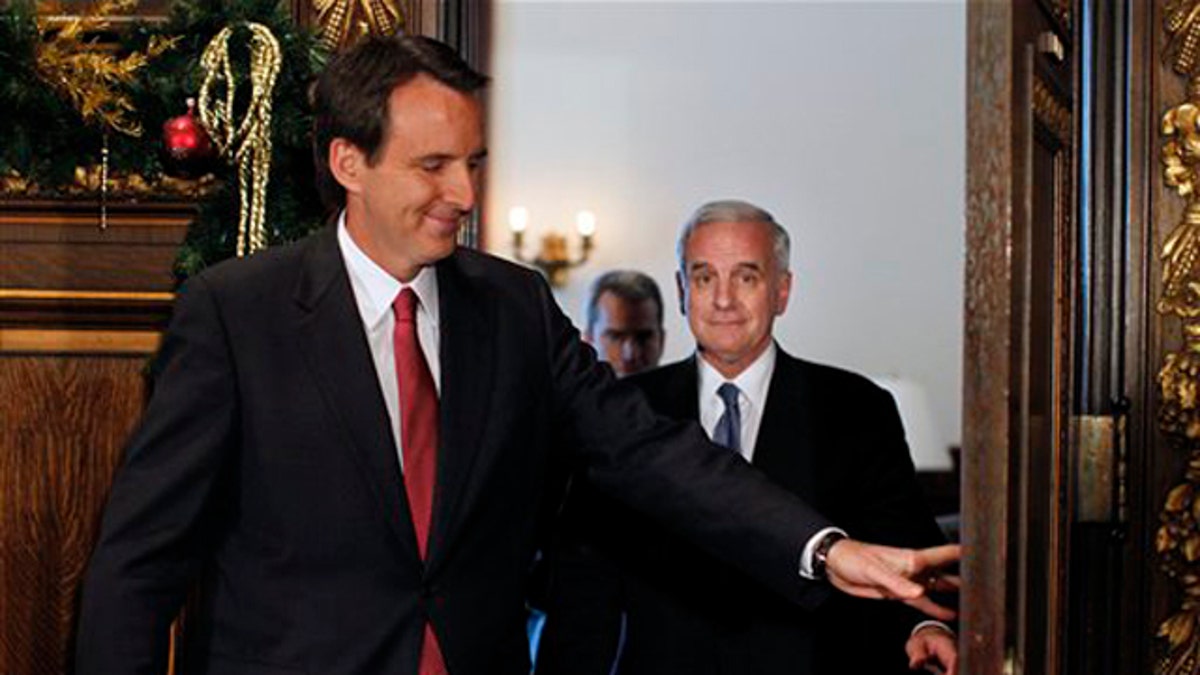
Minnesota Governor-elect Mark Dayton, right, and Gov. Tim Pawlenty arrive at a news conference in the State Capitol Dec. 9 in St. Paul. Minn. (AP Photo)
Minnesota Gov. Tim Pawlenty called Monday for Congress and local governments across the country to join him in stopping the "silent coup" from government-employee unions, arguing that their benefits packages are sucking up vital taxpayer dollars and must be changed.
The Republican governor, who leaves office next month and has been cited as a potential contender for the 2012 GOP presidential nomination., cited as a triumph his state's work in cutting future public pension obligations by $2 billion and taking on mass transit employees over their benefits. He suggested other lawmakers follow or face a combined $3 trillion in unfunded benefit liabilities.
"You have public employees making more than their private-sector counterparts. They used to be under-benefited and underpaid. Now they're both over-benefited and overpaid," Pawlenty told Fox News. "Their post-retirement benefits and salaries and pensions are really one of the driving forces of the financial troubles of cities and counties and school districts and states all across this country, and it needs to stop."
Pawlenty, who belonged to a union when he was a young man working at a grocery store, urged governments to bring public-employee pay "back in line" with the private sector. He praised President Obama for proposing a two-year freeze on federal employee wages and urged Washington to crack down on the size and pay of the federal workforce overall.
In a Wall Street Journal column, Pawlenty urged for more accounting transparency and a different kind of retirement plan. Instead of defined-benefit plans, which are not subject to the whims of the stock market, Pawlenty suggested the public sector go the way of the private sector and opt for a system like the 401(k).
"You have to take the risk like everybody else," he told Fox News.
But the public-sector employee unions say they're being made the scapegoat for the budget problems of governments across the country, including in Washington. The Minnesota chapter of the American Federation of State, County and Municipal Employees put out a fact sheet last week, in response to a critical report on public-employee compensation, saying their members earn just $38,000 a year on average. The chapter said its "modest" pensions average $13,000 a year.
The state's Public Employees Retirement Association also claimed most its retirees receive less than $1,000 a month. The group says its members' benefits are an "easy target for political contenders" because of the up to $3 trillion liability nationwide, but that the unions are trying to correct the problem. The group also argued against shifting to a 401(k), calling them "grossly under-funded."
Federal-employee unions have likewise criticized Obama for backing a two-year pay freeze on their workforce. Tim Kauffman, spokesman for the American Federation of Government Employees, accused Pawlenty Monday of "exploiting working-class anger over high unemployment" and other issues by going after the unions.
Kauffman, in an e-mail to FoxNews.com, said Pawlenty was exaggerating the value of federal pay packages, claiming the workers are actually paid 24 percent less than their private-sector counterparts on a "job-by-job basis." And he said federal employees long ago moved away from defined-benefit retirement plans.
But Pawlenty argues that public-employee unions have gained far too much influence in the halls of power by dumping millions into political campaigns in order to preserve their privileges. He could find some allies in the new House majority come January, as Republicans assuming committee chairmanships promise a new wave of oversight. Rep. Darrell Issa, R-Calif., scourge of the Obama administration, will take command of the House Oversight and Government Reform Committee. Rep. John Kline, R-Minn., will take over the House Education and Labor Committee and is vowing to look closely at unions. Kline was critical of a Dec. 1 Labor Department decision to change the reporting requirements regarding the contents of union trusts -- a move he argued was a "blow" to transparency.
"Once again the Obama administration has decided to limit workers' ability to know how their union dues are used by labor officials. This is the latest in an ongoing effort by the administration to tilt the balance of power in favor of Big Labor and against rank-and-file workers," Kline said in a written statement. "When the new Republican-led Congress begins work next year to restore accountability in Washington, we will examine these instances of executive pandering that diminish workers' rights."




